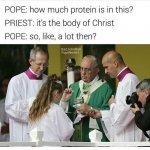Rens
Well-known member
- Joined
- Sep 11, 2015
- Messages
- 4,754
- Age
- 55
- Gender
- Female
- Religious Affiliation
- Pentecostal
- Political Affiliation
- Conservative
- Marital Status
- In Relationship
What do they mean with: it is in substance the body of Christ? What substance? The physical substance is bread, so the spiritual one? Like in: now faith is the substance of things hoped for?
http://www.justforcatholics.org/a34.htm
Question: Though the Catholic doctrine of transubstantiation cannot be proved by the Bible alone, neither can you show that the bread and wine are merely signs of the body and blood of Christ. A literal understanding of Jesus’ words, “This is my body…this is my blood” agrees well with the Catholic doctrine of Christ’s presence in the Eucharist.
[Another reader asked] Jesus' words are plain and clear: This is my body. He does not say, This is a symbol of my body. Why is it that you do not take Christ's words literally like Catholics do?
Answer: Like Evangelicals, Catholics do not take Jesus' words, “This is my body...this is my blood” in a strictly literal sense, for they do not really believe that the bread is Jesus’ body or that the wine is Jesus’ blood. The literal meaning – “This bread is my body; this wine is my blood” -- is a contradiction in terms. Bread is bread, not a human body; wine is wine, not blood. To explain away the obvious empirical facts, clever Catholic theologians have come up with this idea of transubstantiation: What appears to be bread is not bread at all, and though it has all the characteristics of bread, it is in reality (or in substance) the body of Christ! Although this is usually considered a literal interpretation, it is strictly speaking not so.
http://www.justforcatholics.org/a34.htm
Question: Though the Catholic doctrine of transubstantiation cannot be proved by the Bible alone, neither can you show that the bread and wine are merely signs of the body and blood of Christ. A literal understanding of Jesus’ words, “This is my body…this is my blood” agrees well with the Catholic doctrine of Christ’s presence in the Eucharist.
[Another reader asked] Jesus' words are plain and clear: This is my body. He does not say, This is a symbol of my body. Why is it that you do not take Christ's words literally like Catholics do?
Answer: Like Evangelicals, Catholics do not take Jesus' words, “This is my body...this is my blood” in a strictly literal sense, for they do not really believe that the bread is Jesus’ body or that the wine is Jesus’ blood. The literal meaning – “This bread is my body; this wine is my blood” -- is a contradiction in terms. Bread is bread, not a human body; wine is wine, not blood. To explain away the obvious empirical facts, clever Catholic theologians have come up with this idea of transubstantiation: What appears to be bread is not bread at all, and though it has all the characteristics of bread, it is in reality (or in substance) the body of Christ! Although this is usually considered a literal interpretation, it is strictly speaking not so.

